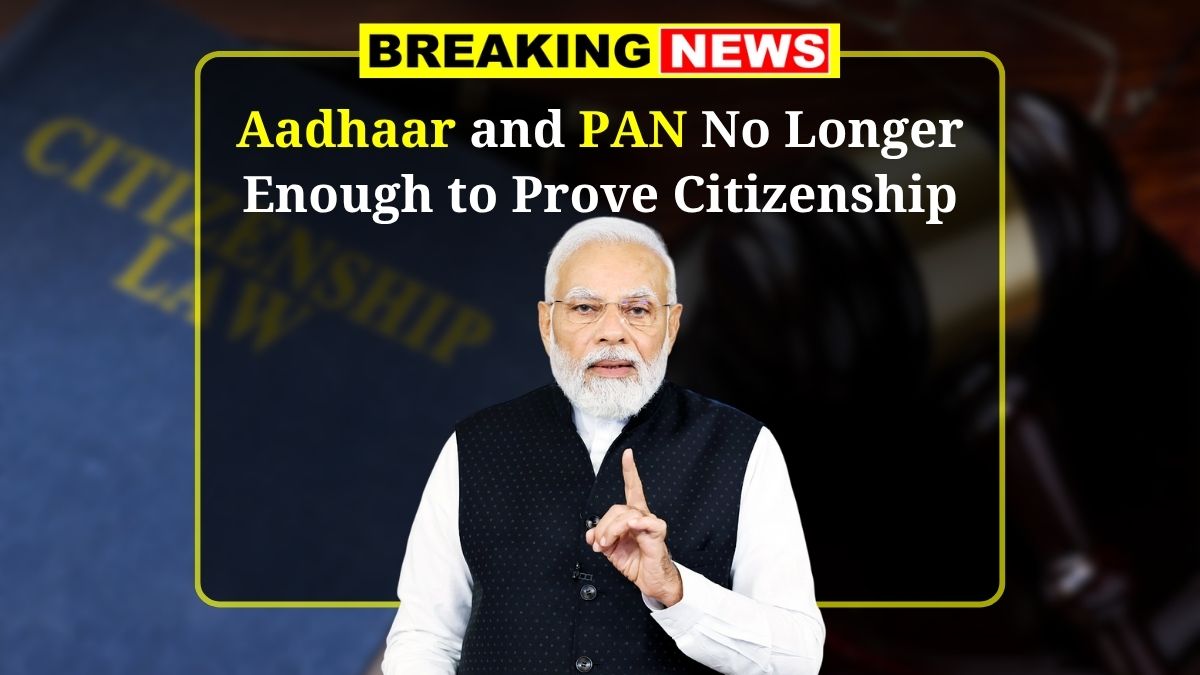Citizenship Verification Rule – If you’ve always thought your Aadhaar card or PAN card was enough to prove you’re an Indian citizen, here’s something you should know — that’s no longer the case. In a big update that’s bound to affect millions, the government has made it clear that neither Aadhaar nor PAN will be accepted as valid proof of Indian citizenship going forward. This isn’t just a casual announcement either — police stations and verification departments have been given strict instructions to enforce this rule. So, if you’re using just Aadhaar or PAN to prove your nationality, it might be time to rethink.
Why Aadhaar and PAN Don’t Count Anymore
You might be wondering why this sudden shift. The truth is, Aadhaar and PAN were never really meant to prove someone’s citizenship. Aadhaar, for instance, is mainly a tool to confirm someone’s identity and address — and it’s issued to any resident of India, including foreigners who are legally living here. Similarly, PAN is primarily a tax-related document, and believe it or not, even non-citizens can have one. So technically, neither Aadhaar nor PAN has ever verified whether someone is actually an Indian citizen — they just prove you exist and pay your taxes (which, frankly, is no small thing either).
What the Government Now Requires
What’s really changed now is that the government has issued formal guidelines saying these two documents should not be accepted as standalone proof of citizenship. This comes as part of a broader push to tighten verification processes, especially during police inquiries, passport verifications, or while applying for government benefits. The idea is to ensure that there’s no room for errors or misuse, particularly in light of growing concerns about illegal immigration and false documentation.
Only Two Documents Will Prove Citizenship
So, what counts now? According to the new rules, there are only two documents that will be accepted as official proof of Indian citizenship: a birth certificate issued by a municipal or civic body, and an Indian passport. That’s it. These are the only documents that can reliably show you were either born in India to Indian parents or have been officially granted citizenship through legal processes like naturalization or registration. Anything else — voter ID, ration card, driving license — might help build your case, but won’t seal the deal on their own.
Why These Two Are Considered Valid
To explain it better, your birth certificate is your proof that you were born in India, presumably to Indian parents, and a passport is issued only after detailed background checks that verify your nationality. That’s why these two carry the weight that others don’t. They’re not just about who you are — they’re about where you come from.
Who This Affects the Most
Now, who’s going to be most affected by this new policy? Quite a few people, actually. If you’re applying for a government job, undergoing police verification for a passport or tenant application, or even trying for a gun license, you’re going to need to prove your citizenship using the new criteria. Students planning to study abroad, NRI and OCI applicants, and anyone applying for certain scholarships or government programs also need to take note — your Aadhaar or PAN won’t be enough anymore.
What You Should Do Now
So what should you do? First, check whether you have a valid Indian passport or a birth certificate from your local municipal office. If you don’t, now’s a good time to start the process. Applying for a passport can take some time, especially if police verification is required, and getting a duplicate or corrected birth certificate might involve a bit of paperwork too. But it’s worth it, because showing the wrong documents during any official process could land you in unnecessary trouble — from delays in passport approvals to outright rejection of your applications.
Risks of Submitting Invalid Proof
Also, if you go ahead and try to submit Aadhaar or PAN as your proof of citizenship now, you might find your application rejected on the spot. The police might not complete their verification, your passport could get stuck in processing, and in legal scenarios, your case might not stand up. Government officials have been told to be extra careful, and those who approve the wrong documents could even face disciplinary action.
The Bigger Picture Behind the Move
At the end of the day, this move is all about streamlining the system and ensuring that the right documents are used for the right purpose. Aadhaar and PAN are still super important when it comes to identification, banking, taxes, and general administration — but they were never designed to prove that you’re an Indian citizen. That’s a job best left to more thorough records like your passport or birth certificate.
So if you’ve got anything important coming up — like a job application, a passport renewal, or even a visa process — make sure you’ve got the right documents in place. It could save you a lot of stress later on.
Disclaimer
This article is for general information purposes only and reflects recent media reports and government announcements as of the time of writing. For official confirmation or updates, please refer to notices issued by the Ministry of Home Affairs or consult with authorized legal or government sources.




